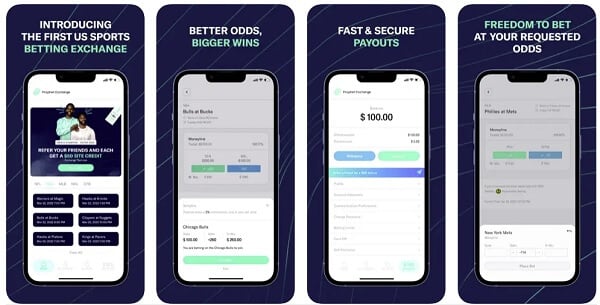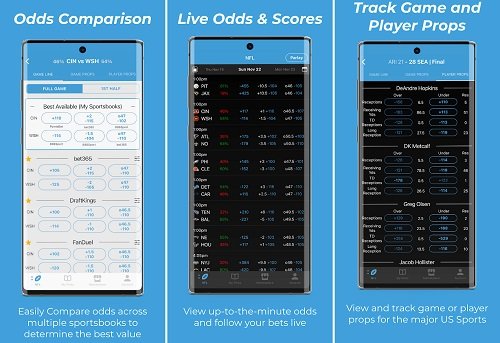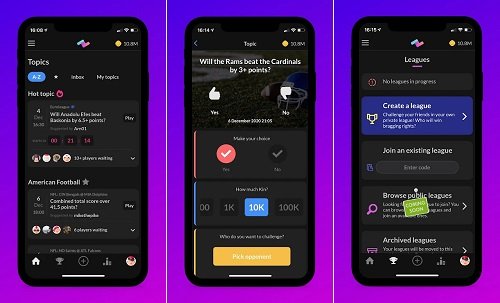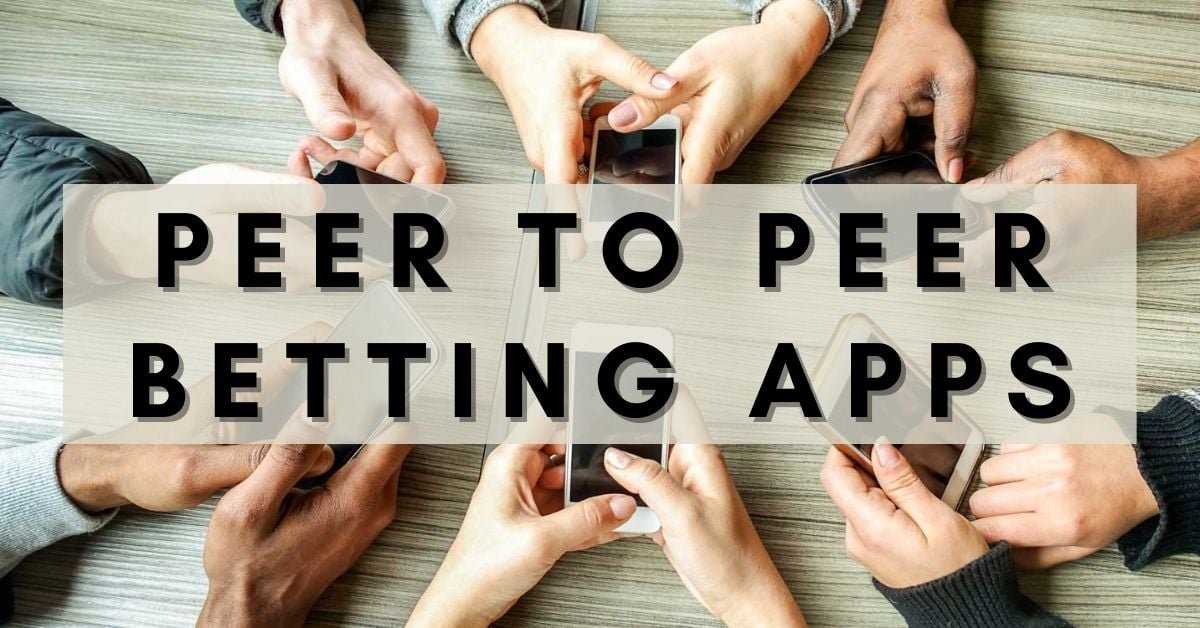Peer-to-Peer Betting Apps
We curated, reviewed & ranked the best P2P betting apps in the US.
Sports betting is rising in the United States, and so is peer-to-peer betting, especially on mobile and specific p2p betting apps.
Peer-to-peer betting is now legal and available in New Jersey with the launch of the very first peer-to-peer betting app, Prophet Exchange. As of August 2022, mobile peer-to-peer wagering became available, and Prophet Exchange jumped in early.
The chance to bet with friends and add more of a social and competitive element makes the gambling experience even more enjoyable. After all, it is fun bets with and against friends. With the launch of new betting app options in states with legal online gambling, bettors are now searching for an app that allows users to participate in peer-to-peer (p2p) sports betting.
The rise in popularity of social gambling p2p betting apps is helped by the number of new market options and sportsbook sites appearing worldwide. Additionally, news of a startup looking to expand peer-to-peer gambling into the digital world has increased the anticipation for a p2p gambling app. Bloomberg recently revealed that Wagr is currently running a seed-funding round that has attracted interested parties such as Reddit co-founder Alexis Ohanian.
What is Peer to Peer Betting?
Peer-to-peer betting is simply a bet primarily between two individuals. If you enter a betting exchange and place a wager, then you are directly betting against a peer.
In some markets, an exchange bettor could also be referred to as a layer or backer. A backer believes an outcome will happen, while a layer takes the opposite stance. One of the things people who participate in p2p betting really appreciate is that there are no bookmakers or oddsmakers involved as the odds agreed by the two parties.
Instead of adding vigorish to their lines, betting exchanges charge transaction fees that are often 50-90% lower than the vig taken by traditional sportsbooks.
ProphetX Sports Exchange
ProphetX.co removes the need for a traditional sportsbook, as you wager against other customers. Think of ProphetX Exchange as a betting marketplace. Other players set odds, and you bet against them. Typically, you can find more favorable odds than you would with a traditional book. As well as getting increased odds, you can play the role of both the oddsmaker and the bettor.

So what is ProphetX like to use? Well, it’s pretty awesome. We tried it the minute it launched and were impressed with the design and functionality. It works in a similar way to traditional apps or a sports betting site where you can search the markets and place a bet. Requesting a bet is easy on the platform, and it’s equally as easy to place a bet on an already existing price.
Key features
- Better prices
- No limits on betting
- Request your own odds
- Low juice on moneylines
BettorEdge
Social media and betting is big business now, but it hasn’t always been the case. Before it really took off, James Seils and Greg Kajewski had an innovative idea to approach this trend and came at it from a different direction. They are the founders of BettorEdge, a social media platform that facilitates exchange betting. They are hoping they can exploit this emerging trend in the marketplace as big names starting paying more attention to looking into how exchanges work and the added interactivity they provide for customers.
BettorEdge is not a traditional online sportsbook and consequently does not have to abide by the same laws that the likes of DraftKings or FanDuel must do. The platform can operate in states where sports betting is not legal. They generate their revenues through advertisements and premium tiers.
BetterEge is currently operating in 46 states and is based in Minnesota. Due to the location of their HQ, a lot of their marketing is heavily focused on the upper Midwest area, where sports betting in Iowa and Michigan is thriving. To highlight the impact the company is having, BetteoEdge announced in July that it had surpassed $3.5 million in exchange orders since it launched in January.
Best Peer-to-Peer Betting Apps
If you are interested in the social aspect of gambling, no doubt you have searched for the best peer-to-peer betting app. Fortunately, we have outlined our top picks for the best peer-to-peer betting apps below, many similar to Betfair. We have chosen a variety of apps that cater to different needs in the peer-to-peer betting app space.
These apps all stand up individually as excellent choices and are well worth downloading. The main categories we looked for when choosing these apps were:
- Core Functionality
- Innovative Features
- User Experience
All of the betting apps listed below excel in each of the above criteria. We have extensively reviewed them to ensure a fantastic gambling experience. Using a free app is a great way to see where you would have put your cash. These friendly sports betting apps can be serious fun, and it’s a great way to hold one over your mate if you continually trash their picks.
Social sports betting, like real money sports betting, is very much on the up. So let’s run down the top 3 peer-to-peer betting apps you can download and wager on for free against friends.
#1 WagerLab – Sports Betting & Prop Bets with Friends
WagerLab lets players bet on over 40 different leagues and categories, including NFL, NBA, MLB, CFB, NCAAM, NHL, UFC (MMA), and the EPL. Soccer fans will be spoilt for choice as you can bet on the Champions League, La Liga, MLS & more. No wonder they call themselves the #1 app for friendly bets.

Standout features:
- Prop bets on social topics
- Multiple bet types
- Google Play Rating: 4.3
- iTunes Rating: 4.7
#2 betstamp – Sports Betting Hub
betstamp offers a lot more than just p2p betting. The app allows you to calculate parlays, track games and player props, see live scores, and more. It really is an action-packed app, ideal for sports and gambling fans.

Standout features:
- Track, analyze, and improve your sports betting
- See live updates on how your bets are performing
- Google Play Rating: 4.4
- iTunes Rating: 4.6
#3 PeerBet – Sports prediction game
PeerBet is one of the new breeds of peer-to-peer betting apps. The platform offers an exciting, fun, and free p2p social prediction game that lets you wager against friends and other players on a massive choice of markets. Make friendly bets on sports, political, and entertainment events, all from the PeerBet app that’s available on iPhone and Android.

Standout features:
- Challenge your friends or bet against other players
- Win game currency
- Google Play Rating: 4.6
- iTunes Rating: 4.5
If you want to get involved in some brilliant social gambling, download any of the above apps and get involved today.
Is Peer-to-Peer Betting Legal?
There is nothing on the face of it to suggest P2P sports gambling is illegal in other US states that have legalized sports betting since the Supreme Court decision in 2018. However, some obstacles exist to overcome before players actively participate in social betting.
Most of the significant issues revolve around the Wire Act, which prohibits wagering across multiple states. This means that a gambler in New Jersey can only bet peer-to-peer with other players in the same state. Straight away, there’s a liquidity problem because there are not enough active bettors to build up large enough pools of money.
Additionally, traditional sports betting operators don’t view betting exchanges positively because they will take away customers. These brands have a powerful voice when lobbying due to the vast sums of money they generate in taxes for each given state.
With that being said, Flutter Entertainment – the owner of the world’s largest betting exchange, Betfair, completed a purchase of daily fantasy sports operator FanDuel a few years ago and could look to do something in the betting exchange market in the US soon. Additionally, Smarkets, a UK betting exchange, plans to launch its hybrid sportsbook in the US. We have also mentioned Zensports above in this article, which also has ambitious plans to expand in the US market. The intentions of these companies highlight that some well-known names are competing for positions to ensure they are well-suited to introduce America to betting exchanges.
Online Sportsbooks vs Betting Exchanges
With a sportsbook like DraftKings the odds and terms are set by the house. This means that the odds you see are what you get. With betting exchanges things work a little differently you’re not betting against the sportsbook but rather other users of the platform.
This means that you can post a bet with a spread of your choice on the market and see if anyone is interested in taking you up on the bet. Once accepted, you both put up a stake that the betting exchange will hold for you until the bet is finalised. Then finally the winnings are transferred to the winner with a small amount being held by the exchange as a fee for using the service.
It’s worth comparing both the odds on a sportsbook with the ones found on an exchange as often one or the other will be more favorable.
P2P Betting Terminology
Betting exchanges are not only popular because bettors can set their own odds for bets, but also because they open many opportunities for arbitrage bettors and hedge betting. Before going further into how you can hedge your bets at peer to peer betting exchanges, it is useful to define the terminology.
Back Bet
To place a back bet, you must propose odds and then submit a stake. Once you have confirmed the details of your prediction, then it is registered in the market and other bettors can place bets against it. For your bet to qualify you need someone to place a back bet against it. If you cannot sell your bet to any bettor, then it does not qualify and will be canceled, returning your stake. Should a peer only buy a portion of your bet, that is, only $10 of a $20 bet, then only that much is active and the rest of your bet is voided. In the case where a peer buys $10 of your bet and leaves the other $10, then only half your bet is in play.
Lay Bet
This is a wager against a back bet. After browsing through the backed bets, you can pick one you want to place a lay bet against, and then can submit a stake. This is where it gets interesting. This bet is on anything but the back bet to win. For example, if a bettor backed team A to win in a soccer game, then the lay bet is on the game to end in a draw or for team B to win. In another example, if the backing bet was on a soccer player to score exactly 2 goals during the game, then the corresponding lay bet is on that player to either score no goals, 1 goal or 3 or more goals.
Liability
When you place a back bet, then you can set your stake and your odds. It is not as straightforward when placing a lay bet. The odds have already been determined for the lay bet, so instead you are asked for liability, and the betting exchange will show a profit margin based on what you type in. Liability here means the amount that you want to stake. Should the backing bet win, then the liability you put into the lay bet will be given to the backer and be part of their profit. If your lay bet wins, then you receive your liability back and you take a part of the profit. What about odds then? well, here is how you can calculate the odds in a lay bet.
- Backing Bet 1: Odds -120 with a stake of $100. Potential return is $183.33
- Backing Bet 2: Odds +220 with a stake of $100. Potential return is $320
As a lay bettor, if you want to take up both lay bets and win the full $200 that this backer is wagering, you need to stake the money that they would profit, should they win. This means, for bet 1 your liability is $83.33 and for bet 2 your liability is $220. The decimal odds of bet 1 and 2 are calculated using the following formula:
Full Return / Liability
- Bet 1: 183.33 / 83.33 = 2.2. American odds are +120
- Bet 2: 320 / 220 = 1.45. American odds are -220
As you can see, if the backing bets stake $100, then calculating the odds on the lay bets means simply flipping the plus and minus signs in the American odds format.
Liquidity
When you want to make hedge bets, then you are going to need liquidity. Put simply, this is the margin of profit you stand to win with your bet, and thus the money that you can use to stake your hedge bet. What you want to do is to sell a back bet and buy the corresponding lay bet on the same event, and pick out a small margin of profit. This can be done in numerous ways. You may try to take advantage of early odds, selling your buy bet at the beginning of the week, and then if during the week the odds should change in your favour, then you can seal a good lay bet. Another possibility is to try in-game bets, but these are far more risky. Live betting is certainly not the same at peer to peer markets as it is at sportsbooks, as you need someone to buy/sell a bet at the right price at the right time.
Hedge Betting at Peer to Peer Betting Exchanges
The theory of hedging a bet at peer to peer exchanges is far simpler than at sportsbooks. As you can make a back bet and a lay bet – which is essentially on anything but the back bet to win, it is always a two-way affair. Just look at soccer moneylines, where there are three possible outcomes, which demands more calculating for hedge bettors.
Back-to-lay and lay-to-back are the two different types of hedge betting. You could either sell a back bet, and then wait to find a lay bet which you can stake using some of your liquidity, thus guaranteeing a profit. Or, lay an existing bet, and then set up a back bet at a price that favors you, and sell it. There are dangers in both methods though.
It is impossible to know ahead of time which way the odds will shift, and how the peers in the market will respond to buying/selling at adjusted prices.
After selling the back bet in a back-to-lay strategy, the hedge bettor is basically waiting for someone to sell a lay bet at a good price. Should the bettor try a lay to back strategy and manages to find a buyer for their lay bet, then they will have to sell a back bet. There is no guarantee that a peer would buy the bet you are trying to sell, and selling a part of it does not work either as you will need your hedge bets to match each other to guarantee a profit.
Final Thoughs on Peer to Peer Betting Exchanges
Betting exchanges have low overheads because they don’t need large oddsmaking teams, so they charge a nominal fee on each wager, far less than the 5-10% you would be charged at a traditional sportsbook. There won’t be any NFL point spreads appearing as -110 at an exchange; you can get them closer to even money.
There are lots of opportunities to get good bang for your buck at betting exchanges, and these platforms can reward bettors who do their homework. Especially if you are looking for good line value, and observe how the odds shift in the days preceding a sporting event. However, we also have to highlight one important risk about peer-to-peer betting.
No one NEEDS to accept your bet
At a regular sportsbook, if a bet is offered, you can always place it and choose how much you want to stake. At a betting exchange, you may not find your bet at the price you want, and if you are selling a bet, there is no guarantee that someone will take you up on your bet. Even if they do, they may not place the entire stake and so you will only be able to stake a percentage of what you wanted.

